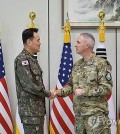- California Assembly OKs highest minimum wage in nation
- S. Korea unveils first graphic cigarette warnings
- US joins with South Korea, Japan in bid to deter North Korea
- LPGA golfer Chun In-gee finally back in action
- S. Korea won’t be top seed in final World Cup qualification round
- US men’s soccer misses 2nd straight Olympics
- US back on track in qualifying with 4-0 win over Guatemala
- High-intensity workout injuries spawn cottage industry
- CDC expands range of Zika mosquitoes into parts of Northeast
- Who knew? ‘The Walking Dead’ is helping families connect
The Response in South Korea to Threats of War? A Collective ¯\_(ツ)_/¯

SEOUL, South Korea — A young, brash dictator in North Korea threatens to lob nuclear missiles at South Korea and its ally, the United States. From Washington, the leader of the world’s most powerful country threatens to slam the North with “fire and fury like the world has never seen.” Headlines brim with talk of possible war on the Korean Peninsula.
How do South Koreans react?
With a shrug.
I was born in South Korea and have reported on its region for American news media for most of my career — for The New York Times since 2005. And yet, whenever I have to report a recurring “crisis” over North Korea’s nuclear weapons program, I feel as if I am living in two different realities.
On one hand, there is a deluge of urgent headlines: Analysts and pundits expound North Korea’s latest motives, serving up their newest estimates on its weapons capabilities. (And, of course, there are President Trump’s Twitter storms. But if he knows how to grab headlines with colorful language, North Korea has mastered that game for decades.)
On the other hand, once I step outside the media and pundit circles, I meet a prevailing calm, even a nonchalance.
The truth is, most South Koreans seem to take things in stride. People in Seoul on Friday evenings are as merry as ever, unmoved by the fact that their city of 10 million lies within the range of North Korean artillery, rockets and missiles.
People here have complained about a recent heat wave more than they’ve discussed the possibility of war. None of my South Korean relatives called me about the North Korean threat. And South Korean journalist friends of mine were hoping, seriously, that they could get a trip to Guam out of the North Korea news. (It’s a popular vacation spot for South Koreans.)
All of which makes the shift from one of my worlds (news) to the other (ordinary life) feel as jarring as exiting a dark movie theater into bright daylight.
The seeming indifference among South Koreans can be explained in part by the simple fact that, despite talk of possible war, there are no telltale signs of either the United States or North Korea preparing to start one.
What might those signs be? A mass movement of North Korean troops and weapons toward the border; the arrival of American warships; the evacuation of 200,000 American civilians, and far more expat Chinese, from South Korea; the elevation of the Defcon military alert status. None of these have been reported, and stock prices in South Korea have hardly blinked.
Behind the collective shrug among South Koreans is also a determination not to unsettle the status quo: a peace that has held for more than six decades under a cease-fire signed at the end of the Korean War. No matter how much they detest the regime in Pyongyang, South Koreans still consider North Koreans their brethren and want to avoid another internecine war.

Still, the first thing I do when I wake up in the morning, even before I leave my bed, is to check the North Korean news agency to see if it has made another bombastic announcement — like the one in which the North recently threatened to launch ballistic missiles around Guam in an “enveloping fire.” But in spite of the rhetoric and the gravity of the military threat, many South Koreans insist that the best way to deal with the North is to keep calm and carry on, and to work together with the United States to deter and punish the North — while avoiding war.
The nonchalance isn’t posturing. After the North launched an intercontinental ballistic missile on July 28, President Moon Jae-in of South Korea went on vacation.
“He was busy posing for photos with tourists at vacation spots and didn’t even bother to call President Trump to discuss the North’s ICBM test,” Chung Woo-taik, a conservative opposition leader, said this week. (Mr. Moon talked with Mr. Trump on Aug. 7 after he returned from his trip.)
But Mr. Moon’s supporters say overreacting to the North will only serve its leader Kim Jong-un’s strategy of appearing dangerous and reckless, as part of an effort to win concessions.
Many here seem to agree — with a shrug.
















10 Daftar Makanan Sehat Untuk Penderita Kolesterol
August 18, 2017 at 2:52 PM
Nice topic and nice explanations. Please have one article on wifi range extender as well.
Best beard trimmer
August 21, 2017 at 4:32 AM
Top 5 Best Body Groomer List for Men
londonjoinery.co.uk
November 28, 2017 at 4:12 AM
Furniture http://www.londonjoinery.co.uk/ is a proposal for people who can not find furniture in their furniture stores for themselves. They are elegant, stylish, perfectly matched to any interior. They are certainly a great investment for many years to come.